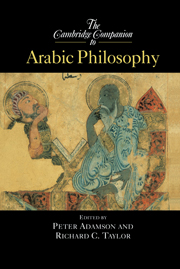Book contents
- Frontmatter
- 1 Introduction
- 2 Greek into Arabic
- 3 Al-Kindī and the reception of Greek philosophy
- 4 Al-Fāarābī and the philosophical curriculum
- 5 The Ismāīlīs
- 6 Avicenna and the Avicennian Tradition
- 7 Al-Ghazālī
- 8 Philosophy in Andalusia
- 9 Averroes
- 10 Suhrawardī and Illuminationism
- 11 Mysticism and philosophy
- 12 Logic
- 13 Ethical and political philosophy
- 14 Natural philosophy
- 15 Psychology
- 16 Metaphysics
- 17 Islamic philosophy and Jewish philosophy
- 18 Arabic into Latin
- 19 Recent trends in Arabic and Persian philosophy
- Select bibliography and further reading
- Index
7 - Al-Ghazālī
Published online by Cambridge University Press: 28 May 2006
- Frontmatter
- 1 Introduction
- 2 Greek into Arabic
- 3 Al-Kindī and the reception of Greek philosophy
- 4 Al-Fāarābī and the philosophical curriculum
- 5 The Ismāīlīs
- 6 Avicenna and the Avicennian Tradition
- 7 Al-Ghazālī
- 8 Philosophy in Andalusia
- 9 Averroes
- 10 Suhrawardī and Illuminationism
- 11 Mysticism and philosophy
- 12 Logic
- 13 Ethical and political philosophy
- 14 Natural philosophy
- 15 Psychology
- 16 Metaphysics
- 17 Islamic philosophy and Jewish philosophy
- 18 Arabic into Latin
- 19 Recent trends in Arabic and Persian philosophy
- Select bibliography and further reading
- Index
Summary
The writings of al-Ghazālī (d. 1111) mark a critical stage in the history of Arabic philosophy. He is noted for his classic, The Incoherence of the Philosophers (Tahāfut al-falāsifa), an incisive critique largely of the metaphysics and psychology of Avicenna (d. 1037). At the same time, he is also noted for adopting Avicennian philosophical ideas. This at first sight seems paradoxical, if not downright inconsistent. In fact, he adopted them after reinterpreting them in terms of his Ash'arite occasionalist perspective (to which we will shortly turn), rendering them consistent with his theology. This reinterpretation is not without intrinsic philosophical interest.
Al-Ghazālī was a renowned Islamic lawyer (faqīh), speculative theologian (mutakallim), but above all an Islamic mystic (sūfī). In his autobiography, written a few years before his death, he states that it was the quest after certainty that motivated his intellectual and spiritual journey and that he finally found this certainty in direct mystical experience, dhawq, a technical Sūfī term that literally means “taste.” Although trained in the Ash‘arite school of speculative theology, kalām, to which he contributed two works, he was also critical of this discipline. This has raised the question of whether his mysticism was at odds with his theology, which included the reinterpreted, assimilated, Avicennian philosophical ideas.
- Type
- Chapter
- Information
- The Cambridge Companion to Arabic Philosophy , pp. 137 - 154Publisher: Cambridge University PressPrint publication year: 2004
- 2
- Cited by



